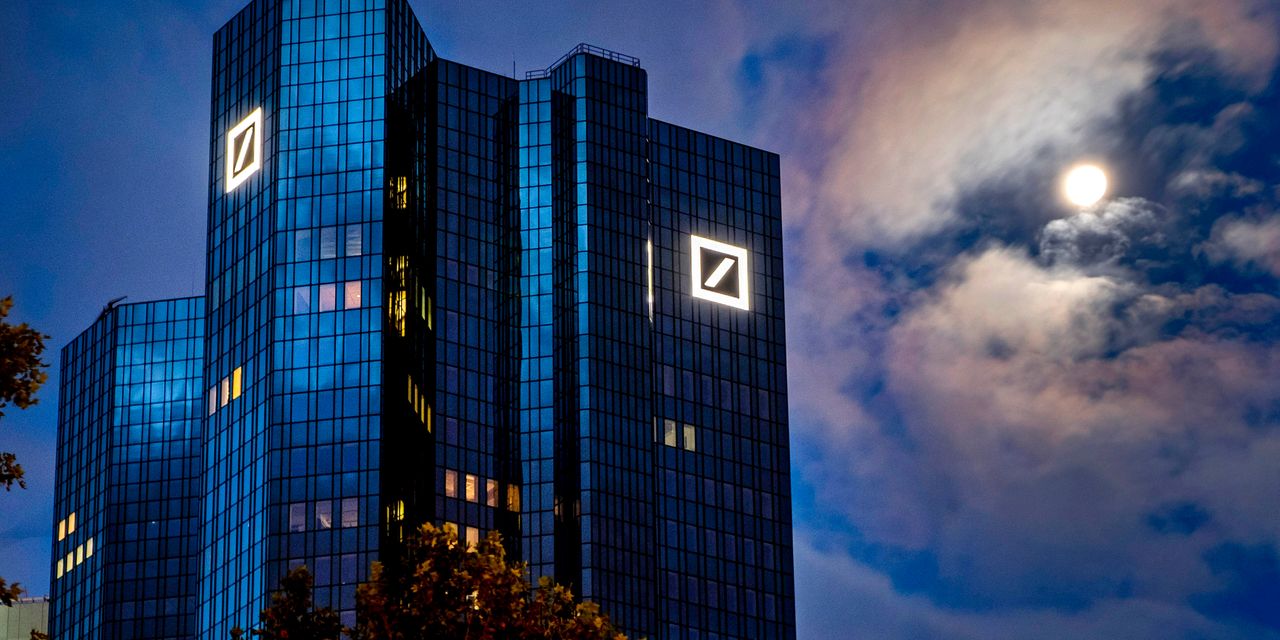Deutsche Bank AG’s results signaled that the bumper profits accruing to its investment bank may have peaked, exposing the deeper challenges the lender faces two years into a strategic makeover.
The Frankfurt-based bank reported a drop in investment-banking revenue in the second quarter as booming client activity during the pandemic slowed down. Still, net profit surged compared with last year as its business lines held better than expected and the economic rebound in Germany put a lid on souring loans.
With the investment-banking business normalizing as the pandemic effects subside, focus will increasingly fall on the performance in its bread-and-butter lending business. Also important to investors: progress on its effort to cut costs.
Those cuts in particular are facing headwinds. Deutsche Bank on Wednesday dropped a specific 2022 cost-cutting target following unexpected regulatory levies that threw off its calculations. Its commitment to cut 18,000 jobs by 2022 has also loosened. Instead, the bank said it will focus on cost relative to income.
“There is no change in commitment and focus on costs,”
Mr. von Moltke
told reporters.
Deutsche Bank’s retail business, meanwhile, has taken a hit from a court ruling related to customer-account fees.
Still, Deutsche Bank said its operations are showing resilience and as a result revenue next year will likely be higher than its previous guidance. It continues to expect group revenue to be flat this year following an exceptional 2020. Under an overhaul plan that began in 2019, the bank has set ambitious targets for 2022, including an 8% return on tangible equity—a key metric for profitability. The figure stood at 5.5% in the second quarter.
Shares of the bank were down 0.3% in morning trade.
The Frankfurt-based bank said net profit rose to €828 million, the equivalent of $978 million, in the three months ended June 30 compared with €61 million a year earlier. The company set aside €75 million to cover for bad loans, compared with €761 million a year earlier, when many countries were under lockdown. The profit was higher than an average analyst consensus of €506 million.
Total revenue dropped 1% to €6.24 billion, as the asset-management business helped offset other areas.
Deutsche Bank surprised investors by posting strong results throughout last year. It reported its strongest quarter in seven years in the first three months. Anchoring the strong performance was its investment bank, which like its Wall Street peers gained from frenzied activity among investors in a volatile market, and companies raising funding and merging as they repositioned their growth plans.
In the second quarter, fees from advising companies on mergers and money-raising continued to grow, but trading revenue fell, leading to an 11% drop in investment-banking revenue to €2.39 billion. Still, its fixed-income trading business did better than Wall Street peers.
Revenue at its business catering to companies fell 8% as some exceptional income from last year didn’t repeat this quarter, and rose 3% at its private bank.
The retail unit, however, still posted a pretax loss as it set aside €128 million during the quarter for possible reimbursements to retail customers. A German court ruled in April that German banks can’t alter terms and conditions on accounts, including raising fees, without getting customers to agree to the changes. They previously assumed customers agreed if they didn’t respond to disclosures about the changes. Revenue was also hit, although new client loans and an increase in investing by existing customers helped offset it.
German and eurozone banks have been struggling in a negative-interest-rate environment that makes the business of taking deposits and lending money less attractive. That makes cost cutting a necessity.
The bank reported a cost-to-income ratio of 80% compared with 85% a year earlier. It has a 70% target for next year. Mr. von Moltke said roughly 8,000 jobs out of some 92,000 have been cut since 2018, and it wants to cut 1,000 more each quarter.
This year the lender is facing unexpected costs, including a higher-than-expected levy from the European Union’s resolution program set up to deal with failing banks. It has said it won’t try to make up for the higher expenses by cutting more elsewhere.
Write to Patricia Kowsmann at patricia.kowsmann@wsj.com
Copyright ©2021 Dow Jones & Company, Inc. All Rights Reserved. 87990cbe856818d5eddac44c7b1cdeb8













































